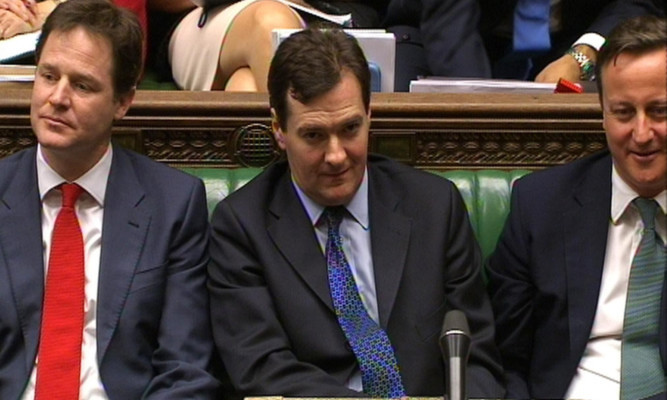
Coalition showed it had bottle for Government but storm is brewing.
At the final Cabinet meeting of this Coalition administration last week, ministers were handed a bottle of beer. This particular brew was called Co-Ale-Ition.
And those quaffing it are entitled to toast the success of an administration almost all onlookers wrote off from the outset but which has stayed standing for a full five years.
Indeed, voters seem to have got such a taste for coalition government that they’ll be ordering another round in May, albeit with different ingredients. Though they may yet get served more of the same.
Last week it was claimed David Cameron is preparing to govern again alongside the Lib Dems. Which is a remarkable thought given what his government has overseen.
They were at a disadvantage from the beginning because as departing Chief Secretary to the Treasury Liam Byrne famously informed them in his handover note: “I’m afraid there’s no money left”.
George Osborne has had to oversee swingeing cuts to public services as any Chancellor taking up the Treasury reins in 2010 would have had to.
The disagreements come over how he has done it and how successful he’s been.
His boast that the Government has halved the deficit looks a little hollow given when Labour’s Alistair Darling proposed doing just that the Tories derided it as too little.
Darling’s plan relied on reducing public spending at a slower pace. Osborne has slashed spending and proposes doing even more. He’s tipped hundreds of thousands of public sector employees on to the dole yet the Government’s record on employment is undoubtedly impressive.
The private sector has created more than two million new positions.
Ed Miliband’s nightmarish predictions of snaking dole queues have just not materialised.
The Government’s welfare reforms have been particularly divisive. The bedroom tax on those judged to have a spare room in their social housing has been so unpopular even the Lib Dems want to bin it now.
The sanctions regime on jobseekers and the work capability assessment programme have generated many stories of people forced to go to foodbanks because their benefits have been stopped for missing a meeting or seriously-ill people judged fit to work.
But, for all the controversy, the economy is now growing again and outperforming almost every other nation.
There’s no doubt now Osborne’s stringent economic medicine has worked. The questions are over whether it was the most effective and most humane course of treatment.
And the lack of cash in Government coffers didn’t stop Osborne handing out goodies.
In 2012, he cut the top rate of tax and tried to be clever by tightening up VAT rules having already raised sales tax immediately after getting his feet under his Treasury desk.
This came to be known as the “omnishambles” Budget as the Chancellor was derided for creating a pasty tax, a granny tax and a caravan tax while reducing top-rate taxpayers’ bills undermined the “We’re all in it together” message that the formation of the Coalition seemed to represent.
Six months after that Budget, Osborne was booed at the Paralympics, the low point of his time as Chancellor.
But he’s bounced back and, perhaps burned by that experience, resisted the temptation to put together a giveaway pre-election Budget earlier this month.
The Olympics were one of the high points of the Coalition’s five years in Government, though to be fair they were really a New Labour project won for London by the force of personality of Tessa Jowell and particularly Tony Blair.
Other successes have included the military action in Libya though that appears to have been a very short-term success and, from the Coalition’s point of view, winning the independence referendum.
But, if they won the battle on Scotland, the Prime Minister’s decision to open up the issue of “English Votes on English Laws” the morning after looks increasingly like one of his poorer political judgments.
The constitution was the area in which the Coalition partners have disagreed most.
Relations between the parties reached their most sour when David Cameron failed to deliver his party’s support for House of Lords reform.
In return, Nick Clegg spiked plans to redraw constituency boundaries, an act that could cost the Tories dear at the election since the current electoral map marginally favours Labour.
Constitutionally, the Coalition has been a curiosity in itself. Two parties forming one Government and signing an agreement on it is unprecedented. Commentators looked forward to a few months’ honeymoon followed by years of bickering and, ultimately, failure. That hasn’t happened.
Structures were put in place to resolve party differences and the Quad Cameron, Osborne, Clegg and Treasury Chief Secretary Danny Alexander have formed a determined driving force keeping the Coalition on the road. Those personal relationships could count for much when it comes to forming a Government after May.
The question is whether the electoral arithmetic will allow it.
Coalition, the prize the Lib Dems have held out for since their inception, has been their undoing. From the 2011 referendum on changing the voting system onwards it’s been nothing but polling-day misery for Clegg and his comrades.
Labour will harvest dozens of swing seats in May because former Lib Dem voters have swung into their camp and are among the least likely to change their vote before polling day.
But for every English seat Labour picks up, they may lose one in Scotland.
And that could leave them locked out while Clegg and Cameron brew up another five years in power.

Enjoy the convenience of having The Sunday Post delivered as a digital ePaper straight to your smartphone, tablet or computer.
Subscribe for only £5.49 a month and enjoy all the benefits of the printed paper as a digital replica.
Subscribe